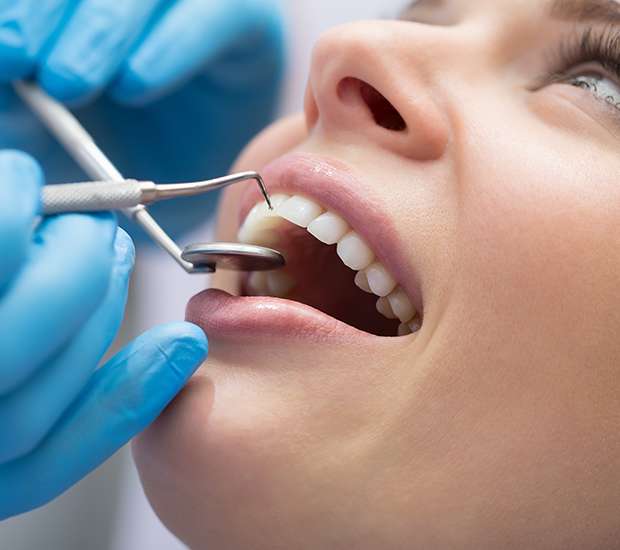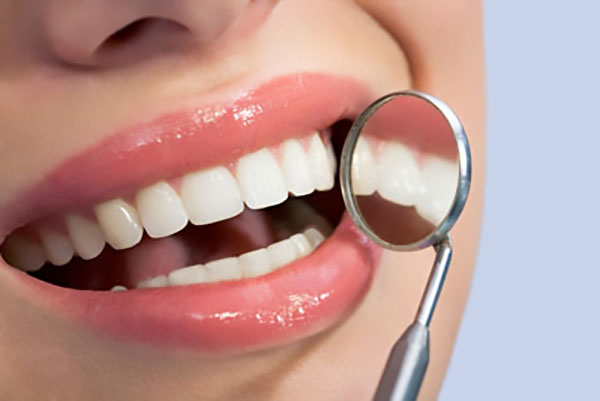Dentures in Huntersville, NC
Replace Missing Teeth & Boost Your Confidence With Dentures
Are missing teeth impacting your smile as well as your ability to eat, speak, and maintain overall oral health? The absence of teeth can be a significant concern for many individuals, affecting function and aesthetics. Fortunately, our highly skilled Huntersville, NC dentist, Dr. Scott Guice provides a restorative solution in the form of dentures.
If you’re one of the many individuals seeking to restore your confident smile, contact Lake Norman Dentistry today by calling Dr. Guice at (704) 895-3858.
What Are Dentures?
Denture appliances are for replacing missing teeth and restoring oral functionality and aesthetics. They're custom-made to fit comfortably within the mouth and can be removed and reinserted at will. Primarily, dentures serve the purpose of chewing, speaking, and supporting facial muscles, enhancing overall oral health and confidence.
Types of Dentures
Full Dentures
Full dentures, also known as complete dentures, are used when all natural teeth are missing. These dentures consist of a flesh-colored acrylic base that fits over the gums. The upper denture covers the palate, while the lower denture is shaped to accommodate the tongue.
Partial Dentures
Partial dentures are recommended when some natural teeth remain. They consist of replacement teeth attached to a pink or gum-colored base, often connected by a metal framework to hold them in place. These partials fill gaps left by missing teeth and prevent remaining natural teeth from shifting position.
Implant-Supported Dentures
Implant-supported dentures offer enhanced stability by attaching to dental implants surgically placed in the lower jawbone. These dental implants act as anchors for the denture, providing a secure fit and reducing movement or slippage while eating or speaking.
Crafting and Fitting Dentures
Initial Consultation and Examination
Your Huntersville dentist conducts a comprehensive oral examination, assessing the condition of existing teeth and gums. X-rays, impressions, and measurements of the mouth and jaw are taken to create a precise model.
Designing the Dentures
Based on the collected data, a personalized treatment plan is developed. The design phase involves choosing the type of denture, selecting materials, and crafting a mock-up for patient approval.
Fabrication
The approved design is used to create the dentures. Skilled technicians construct the base and prosthetic teeth, ensuring they match the shape, size, and color for a natural look.
Trial Fitting
Initially, a temporary set is tried on to check the fit and make necessary adjustments. This phase ensures the dentures align properly with the gums and adjacent teeth.
Final Fitting
Once adjustments are made, the final dentures are ready for fitting. Dr. Guice ensures the fit, comfort, and bite alignment, making any final adjustments if needed.
Guidance and Care Instructions
Dr. Guice provides instructions on how to care for the dentures, including cleaning routines, handling techniques, and follow-up appointments for adjustments or assessments.
Post-Fitting Adjustments
Your dentures may need minor adjustments as the mouth adjusts to the new dentures. Regular check-ups allow your Huntersville dentist to fine-tune the fit for maximum comfort and functionality.
Complete and Partial Denture Aftercare
Maintaining proper care for your complete or partial dentures is essential to ensure their longevity, functionality, and overall oral health. Here are key aftercare guidelines to follow:
- Brushing: Brush your dentures daily with a soft-bristle brush and non-abrasive denture cleaner or mild soap. Avoid regular toothpaste, as it may be too abrasive and damage the denture material.
- Soaking: Remove your dentures at night and soak them in a denture-cleaning solution or warm water. This helps to prevent bacterial growth and keeps your dentures clean.
- Brush Natural Teeth: If you have partial dentures, continue to brush and floss your remaining natural teeth daily. This supports the health of your natural teeth and maintains oral hygiene.
- Avoid Dropping: When handling your dentures, do so over a soft surface or a filled sink with water. This minimizes the risk of damage if they accidentally slip from your hands.
- Careful Rinsing: After eating, rinse your dentures to remove loose food particles. Handle them carefully to avoid bending or damaging the clasps on partial dentures.
- Professional Cleanings: Schedule regular check-ups and professional cleanings with your Huntersville dentist, such as those provided by Lake Norman Dentistry. Professional cleaning helps to remove stubborn deposits and ensures the proper fit of your dentures.
- Adjustments: If you experience any discomfort, sore spots, or changes in fit, contact your Huntersville denture provider promptly. Professional adjustments may be needed to maintain comfort and functionality.
Frequently Asked Questions
How many teeth must be missing for dentures?
Dentures are typically recommended when a person has lost several or all of their teeth. Full dentures are used when all teeth in an arch (either upper or lower) are missing. A partial denture is utilized when some teeth remain, filling in the gaps caused by missing teeth.
How many years can you wear dentures?
The lifespan of dentures varies based on several factors such as the quality of materials used, regular maintenance, and changes in the mouth's structure over time. On average, dentures can last between five to 10 years before requiring replacement or adjustments due to wear and tear or changes in the jawbone and gums.
What type of dentures are most natural-looking?
Porcelain dentures are often considered the most natural-looking due to their ability to closely mimic the appearance of teeth. Porcelain has a translucent quality similar to natural tooth enamel, providing a more realistic look. Acrylic and composite resin materials have also advanced, offering improved aesthetics and durability.
How long do you wait to get dentures after your teeth are pulled?
The timeframe for getting dentures after having teeth extracted can vary. Immediate dentures are placed right after teeth removal, allowing the patient to have teeth immediately. Adjustments and modifications may be necessary as the gums heal and shrink. This procedure allows for a better fit and reduces frequent adjustment appointments.
Restore Your Smile With Comfortable Dentures at Lake Norman Dentistry!
Rediscover confidence and function with complete dentures and partial dentures from Dr. Guice. At Lake Norman Dentistry, our personalized denture solutions offer an easy and affordable way to restore your smile. Schedule your denture consultation today at (704) 895-3858.
Lake Norman Dentistry is proud to serve North Carolina and surrounding areas such as Charlotte, Cornelius, Lowesville, and Huntersville. Transform your smile with precision, care, and the expertise of Lake Norman Dentistry.
Definition of Dental Terminology
- Cosmetic Dentistry
- Cosmetic dentistry is generally used to refer to any dental work that improves the appearance (though not necessarily the function) of a person’s teeth, gums and/or bite.
- Decay
- Tooth decay is when the enamel of the tooth begins to decay and cause erosion from plaque and tartar on the teeth.
- Dental Caries
- Dental caries is also known as cavities and result from a lack of proper oral hygiene leaving plaque that forms tiny holes in the teeth.
- Dental Checkup
- A dental checkup is an appointment that involves cleaning the teeth, identifying any signs of infection and removing said signs of infection at least once every six months in the office.
- Dental Filling
- A dental filling involves restoring the structure of the tooth by using metal, alloy, porcelain or plastic to fill the tooth.
- Dental Prophylaxis
- A dental prophylaxis is a professional and detailed cleaning that involves the removal of plaque, calculus and stains from the teeth.
- Dental Sealants
- Dental sealants contain a resinous material that we apply to the chewing surfaces of the posterior teeth to prevent dental caries.
- Dentist
- A dentist, also known as a dental surgeon, is a doctor who specializes in the diagnosis, prevention, and treatment of diseases and conditions of the oral cavity.
- Gingivitis
- Gingivitis is the inflammation of gum tissue that results from plaque, other infections in the mouth and poor oral hygiene.
- Preventive Dentistry
- Preventive dentistry is the dentistry that focuses on maintaining oral health in order to prevent the spread of plaque, the formation of tartar and infections in the mouth.
- Tartar
- Tartar forms when plaque builds up on the surface of the teeth and calcifies into a hard surface that is much more difficult to remove and will require professional treatment.
- Tooth Enamel
- Tooth enamel is the protective visible outer surface of a tooth that contains the dentin and dental pulp.
Back to top of Dental Bonding




